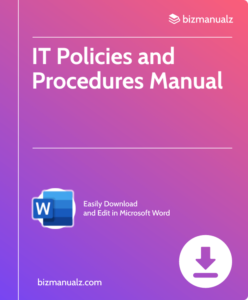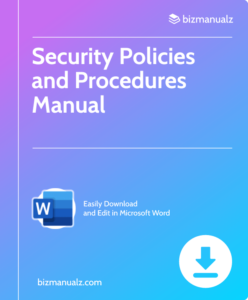Which of These Organizations Offers Guidelines on Developing Security Policies?

Creating security policies is a major part of any organization’s cybersecurity plan. To guarantee robust and effective policies are in place, it is best to follow the guidelines given by reliable organizations. Which of these organizations offers guidelines on developing security policies?
Security Policy Development
Security policy development is the process of creating and implementing rules to protect an organization’s information and assets from possible threats. It’s essential for businesses to have secure policies that tackle cybersecurity.
Organizations that offer guidelines on this subject:
| Organization | Guidelines Offered |
|---|---|
| National Institute of Standards and Technology (NIST) | NIST Special Publication 800-53 |
| International Organization for Standardization (ISO) | ISO/IEC 27001:2013 |
| Center for Internet Security (CIS) | CIS Controls |
| Federal Information Security Management Act (FISMA) | FISMA Legislation |
The National Institute of Standards and Technology (NIST) offers detailed instructions on security policies. NIST has a framework called the Cybersecurity Framework. It helps organizations to evaluate their current security state, identify where to improve, and make security policies that fit their needs.
The International Organization for Standardization (ISO) also provides security policy direction. ISO has standards under the ISO/IEC 27000 series for information security management systems. These standards explain how to do risk assessment, put in controls, and document policies.
The Center for Internet Security (CIS) has resources for security policy development too. CIS has security benchmarks called CIS Controls that cover many cybersecurity best practices. Organizations can use the controls as a guide to make sound and useful security policies.
These organizations are known for providing useful frameworks and recommendations, helping businesses make effective security policies. NIST has 800-53 which outlines best practices for information security. ISO has ISO/IEC 27001:2013 which concentrates on information security management systems. CIS provides well-known CIS Controls, which set out essential actions to enhance and organization’s security. FISMA requires agencies to make security policies to keep their systems and data safe.
Having a clear security policy is necessary in today’s digital world. By following these guidelines from NIST, ISO, CIS, and FISMA, businesses can lower risks and defend themselves against potential cyber threats. Do not miss out on using these resources to make your organization’s security measures effective.
It’s compulsory to adopt the right security policies in today’s connected world, where data breaches can have devastating consequences. So, take action now to guard your assets and keep customers’ and stakeholders’ trust.
NIST, ISO, CIS, and FISMA have you covered when it comes to developing security policies—nothing says ‘peace of mind’ like a lengthy, 50-page document full of fine print!
Organizations Offering Guidelines on Developing Security Policies
When it comes to security policies, organizations like NIST, ISO, PCI DSS, CIS, IETF, and OWASP provide valuable guidelines. These ensure companies protect their sensitive info and reduce risks. Every one of these orgs is vital for policy-making.
NIST has comprehensive guidelines for cyber security. ISO has globally-accepted standards for information security systems. PCI DSS focuses on payment card data. CIS has benchmarks and config guidelines. IETF creates protocols and standards for the internet. and OWASP offers guidance for web apps.
Plus, other industry-specific bodies or gov’t agencies may offer tailored guidelines. To make effective policies, follow these tips:
- Do risk assessments to find vulnerabilities.
- Involve key people like IT, legal, HR, and management.
- Keep policies up-to-date.
- Educate employees about security threats.
- Use multi-factor authentication (MFA).
- Monitor and analyze security incidents.
These steps help organizations stay secure and protect their assets. A balanced approach to policy-making is key. So, pick someone experienced and reliable – like a lock-picking specialist!
How to Choose the Right Organization for Your Security Policy Development
Selecting the suitable organization for your security policy development is vital. Search for organizations that present comprehensive instructions on developing security policies. These organizations possess knowledge in forming efficient tactics to guard your data and systems from possible threats. They can provide helpful ideas on industry best practices, regulatory agreement requirements, and new trends in cybersecurity.
Moreover, think about organizations that have a successful track record in helping companies with their security policy development. Look for customers’ reviews and case studies that demonstrate their triumph in executing secure measures for businesses like yours.
It is also important to pick and organization that puts emphasis on ongoing support and refreshes. Cybersecurity threats are frequently changing, so you require and organization that can transform and provide constant guidance to guarantee your policies stay relevant and effective.
Pro Tip: When selecting and organization for your security policy development, think of partnering with professionals who have familiarity in your special industry. This guarantees that they understand the special challenges and regulations you may confront, leading to personalized solutions for your business.
Steer clear of security breaches by finding organizations that offer guidelines on developing secu
rity policies!
Guidelines on Developing Security Policies
Organizations like NIST, ISO, and PCI SSC provide helpful guidelines for developing security policies. These are widely recognized and respected in the industry.
ISO 27001 is a popular standard that outlines requirements for info security management systems. This includes policy formation.
PCI SSC offers guidelines for organizations dealing with credit card data. This helps secure payment card info, shielding both businesses and customers.
An example of the importance of security policy development is a multinational’s data breach. This caused financial and reputational damage. But, by following industry best practices and updating security policies, they were able to restore customer trust and stop future breaches.
It is vital that companies stick to these guidelines to reduce risks and protect sensitive data. Ignoring security measures can lead to serious issues in today’s connected world.
Frequently Asked Questions
1. Which organizations offer guidelines on developing security policies?
There are several organizations that offer guidelines on developing security policies. Some of the prominent ones include:
– National Institute of Standards and Technology (NIST) – International Organization for Standardization (ISO) – Information Systems Audit and Control Association (ISACA) – The Center for Internet Security (CIS) – SANS Institute – Payment Card Industry Security Standards Council (PCI SSC)
2. What is the role of the National Institute of Standards and Technology (NIST)?
NIST is a federal agency that develops and promotes measurement standards and guidelines. They play a crucial role in the cybersecurity realm by providing guidance on developing security policies, frameworks, and best practices.
3. How does the International Organization for Standardization (ISO) contribute to security policy development?
ISO develops globally recognized standards for various industries, including IT security. Their ISO/IEC 27001 standard specifically focuses on information security management systems and provides guidelines for developing security policies.
4. What kind of resources does the Information Systems Audit and Control Association (ISACA) offer?
ISACA offers a wide range of resources to support security policy development. They provide frameworks like COBIT (Control Objectives for Information and Related Technologies) and publish numerous articles, guides, and certifications related to IT governance, risk management, and security.
5. How does The Center for Internet Security (CIS) assist with security policy development?
CIS is a non-profit organization that develops and provides benchmarks, best practices, and tools to help organizations enhance their security posture. They offer guidelines and templates for developing security policies based on industry standards.
6. What is the role of the Payment Card Industry Security Standards Council (PCI SSC)?
The PCI SSC is responsible for maintaining and evolving the Payment Card Industry Data Security Standard (PCI DSS). Their guidelines focus on securing cardholder data and provide comprehensive security requirements and policies for organizations that handle payment card information.


















Leave a Reply